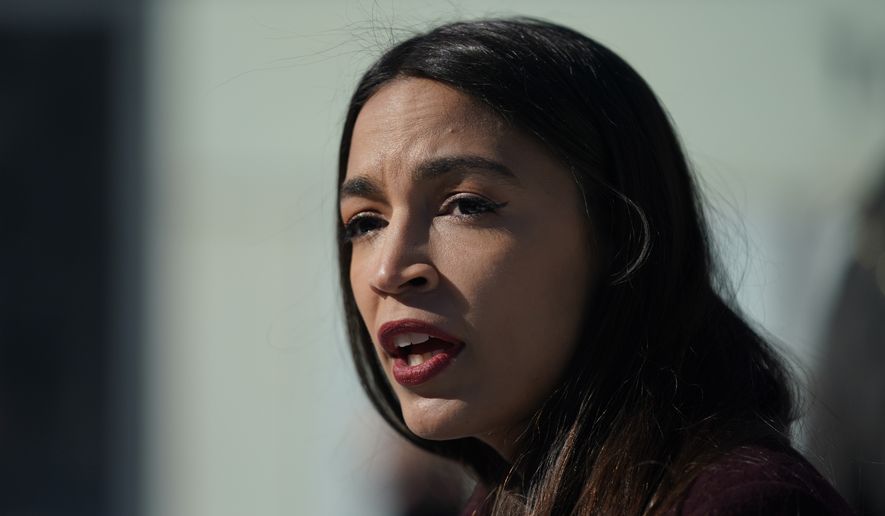Far-left progressives revived their push for the Green New Deal on Tuesday, arguing that President Biden’s ambitious $2.25 trillion infrastructure and energy package can be “bigger and bolder.”
“Do we intend on sending a message to the Biden administration that we need to go bigger and bolder,” said Rep. Alexandria Ocasio-Cortez, New York Democrat. “The answer is absolutely yes,” she said.
Ms. Ocasio-Cortez authored the original Green New Deal in 2019 with Sen. Edward J. Markey, Massachusetts Democrat. At the time, the measure received widespread media attention but was a nonstarter given that Republicans controlled the Senate and President Trump was in the White House.
Now, with Democrats in control of both Congress and the presidency, Mr. Markey says the momentum has shifted.
“For the past two years, it has been proven that the Green New Deal isn’t just a resolution, it is a revolution,” he said. “We believe that this is the moment that requires us to act big, think big, have a program that matches the magnitude of the problem that we’re confronted with, and to do so with justice.”
Ms. Ocasio-Cortez pointed to the fact that 103 House Democrats have signed on to support the Green New Deal’s reintroduction as further proof.
The Green New Deal’s reemergence comes as the Biden White House has unveiled its multitrillion-dollar infrastructure and green energy proposal.
Mr. Biden has proposed spending upwards of $2.25 trillion. Of that sum, $620 billion would be delegated to upgrading existing and building new transportation infrastructure.
A further, $650 billion is earmarked for universal broadband, clean water, affordable housing, and upgrades to the electrical grid. To the chagrin of some Republicans, who argue that infrastructure should focus explicitly on roads and bridges, Mr. Biden’s plan also calls for $400 billion for caregiving for older adults.
Progressives such as Mr. Markey and Ms. Ocasio-Cortez, however, say that does not go far enough when the impact of climate change is “life and death.”
Like many on the left, they argue the Green New Deal poses a better alternative for infrastructure, climate change and job creation.
Estimated to cost anywhere between $53 trillion and $93 trillion, the Green New Deal has the same goal as Mr. Biden of reaching net-zero greenhouse gasses emissions by 2050. The proposal, though, significantly expands spending and government programs to meet the target.
The iteration of the Green New Deal introduced this week allocates $1 trillion over the next four years to make America’s cities more environmentally sound. It requires that 50% of that funding goes to communities of color, which progressives claim are disproportionately affected by climate change.
The updated plan also includes $172 billion to retrofit public housing to be carbon neutral.
In a direct shot at the White House, Mr. Markey and Ms. Ocasio-Cortez’s Green New Deal endorses Mr. Biden’s call for a 100% clean electricity standard by 2035. It dictates, however, that a truly clean electricity standard will shun all forms of fossil fuels, including coal and natural gas. Mr. Biden’s proposal, meanwhile, keeps electricity generated by such sources in place, albeit with more regulation.
“The era of the Green New Deal has arrived,” Mr. Markey said. “No longer will justice get an IOU for the sake of CO2.”
“We can’t compromise on science, policies will take steps to save the planet or they will not,” the senator added. “We have the technology do it, we have the economic imperative to do it, we have the moral obligation to do it. And we need the political will to do it.”
Despite Mr. Markey’s rhetoric, the Green New deal is likely unable to pass the Senate, where both parties are tied at 50-50. For it to survive a filibuster at least 10 Republicans would have to sign on in support.
Sen. John Barrasso of Wyoming, the ranking Republican on the Senate Energy Committee, said GOP support was unlikely since the proposal was seen by many on the right as “socialist.”
• Haris Alic can be reached at halic@washingtontimes.com.




Please read our comment policy before commenting.